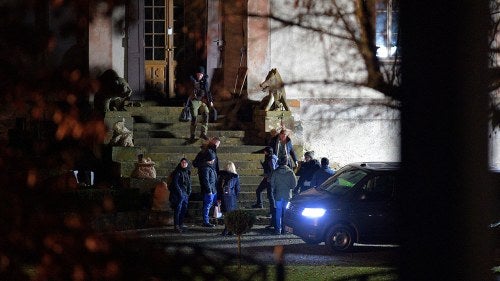Germany's Coup Plot and the Threat to Democracy in an Age of Conspiracy

A plot to overthrow the German government highlights the risks—and reach—of unchecked conspiracy in an age of mistrust, writes Chris Morris.
Conspiracies create strange bedfellows, and when their secrets are revealed, obscure individuals are thrust unexpectedly into the limelight.
A plot to overturn democracy in Germany, which was uprooted last week in a series of dawn raids by the police and security services, had common cause with some of the wilder elements of right-wing nationalism in the United States. And the cast of characters was equally bewildering.
Instead of a self-styled shaman wearing horns and a bearskin headdress, a minor German aristocrat wearing tweed jacket and corduroy trousers took center stage. Prince Heinrich XIII of Reuss had long been shunned by his noble family, but from a 19th century hilltop hunting lodge in the east German state of Thuringia he is accused of plotting violent revolution.
His alleged coconspirators were a motley crew: a Russian girlfriend who tried unsuccessfully to get the Kremlin involved, a far-right politician-turned-judge, a pilot, a celebrity gourmet chef, and—more disturbingly—former and serving members of the armed forces and the police.
It is always tempting to dismiss the fringe as farce, and to argue that taking extremist movements seriously can only strengthen their quest for legitimacy. But, as we’ve seen in a number of countries now, radicalization is becoming more common, and complacency can be fatal.
The German plotters had allegedly been planning an armed insurrection against the state for more than a year: they had been hoarding weapons, and they were ready to use them; they were preparing for what they called Day X when they had plans to storm parliament and take hostages; and, in messages intercepted by the authorities, they had admitted that “representatives of the current system” were likely to be killed as a result.
“These are not harmless crazy people but suspected terrorists who are now in custody,” Germany’s Interior Minister Nancy Faeser said in an interview with the Bild newspaper on Sunday. She said the government would move to tighten gun ownership laws as a result.
The Spread of QAnon
Some of those involved in the plot had been inspired by the QAnon cult of conspiracy (based initially on the belief that a network of devil-worshipping pedophiles had taken control of the US government). It is another reminder that QAnon, and the nonsense it promotes, is spreading far beyond the United States.

Federal German prosecutors, using language which will be familiar to followers of American politics, said the conspirators led by Prince Heinrich were “firmly convinced that Germany is currently governed by members of a so-called ‘deep state’.”
In fact, parallels with the United States are inescapable, not just in Germany but across Europe. Among a committed minority, there is a deeply held belief, not based on factual evidence, that legitimate government has been usurped. Believers in QAnon are merging with those who think COVID-19 was part of an establishment plot to create a new world order, and with dangerous elements on the far right.
Prince Heinrich also dabbled in crude antisemitism, echoing many of the conspiratorial tropes which have taken root on the fringes of American politics. In recent weeks, the casual racism of the American rapper Kanye West has illuminated this scourge, but the challenges run far deeper.
So, is a disturbing pattern emerging? I think we have to accept that it is. The storming of the US Capitol by supporters of Donald Trump on January 6, 2021 served as a reminder of how quickly conspiracy can degenerate into mob violence. Events over the last few weeks in Germany emphasize that this is not just an American problem.
Parallel Contagions
It is indisputably the case that the renewed rise of political extremes, in countries widely regarded as stable democracies, was accelerated by the unprecedented effects of COVID-19. Isolation during the pandemic pushed far more people to spend far more time in the virtual echo chambers where conspiracies flourish. Suspicion of vaccines, and opposition to mandatory mask-wearing and lockdowns, added fuel to the fires burning in the maelstrom of the internet.
Events in Germany illustrate this all too well. In 2020, the head of the domestic intelligence agency described far-right terrorism and extremism as “the biggest threat to democracy” in the country. A few months later, far-right protestors opposed to lockdowns tried briefly to storm the German parliament building, in a precursor to the January 6 attack in Washington.
Some of those involved were waving the flag of the German Reich or Empire which was dissolved in 1918 at the end of the First World War. These were the Reichsbürger, or Citizens of the Reich, who refuse to recognize the legitimacy of the modern German state. They were also at the heart of the unsuccessful conspiracy led by Heinrich XIII to try to overthrow democracy.
The Reichsbürger have been active on the fringes of German politics for decades, and like other supporters of the far-right, they have long been under surveillance. Unlike neo-Nazis, though, the Reichsbürger themselves were once viewed as relatively harmless eccentrics. But that changed in 2016 when one of their followers opened fire on police officers while resisting arrest, killing one officer and injuring three others.
Earlier this year, another alleged plot was unearthed—this time to kidnap Germany’s health minister, Karl Lauterbach, and to cause nationwide blackouts by taking down the power grid. It too emerged from the diffuse network of people radicalized under the Reichsbürger banner.
So, the latest plot to be thwarted should not come as a surprise, but it does beg the question of how many other conspiracies may be simmering, and where the next threat will appear? More than 50 people are under investigation in Germany in the wake of last week’s raids, and the authorities believe more than 20,000 people may subscribe to views similar to Heinrich XIII and his followers.
Insight and understanding delivered straight to your inbox
The world is always changing. Enter your email below to stay informed and engaged in the world's most critical issues through our weekly Global Insight newsletter.
Telling a Good Story
Why do so many people in so many countries now adhere to such apparently strange beliefs? Even before COVID struck, there was a growing sense of dislocation as citizens of wealthy democracies feared they were losing control of so many parts of their lives. Successive economic crises have amplified those feelings, and in this age of uncertainty, social media has made it easier to disseminate radical and even violent ideas.
There is never a single narrative on the internet. There is always a network of competing narratives just one click away. And the strange tale of the plot against the German state is a reminder of the power that a compelling narrative has to give people something to believe in. Conspiracies are based on stories; however outlandish they may be. And the fabric of modern life is creating new stories which radicalize believers and attract new recruits.
So, one of the challenges for people who care about democracy, and who want facts to remain the bedrock of our public discourse, is to tell better stories than those who are happy to ignore the facts altogether. Telling stories, and getting information from stories, is hardwired into our DNA and the spread of conspiracies, like the plot in Germany, warns us that facts alone are not enough.
Journalists know this instinctively. Anyone who has worked in a newsroom has heard someone shout across the desk, or even the room, “that’s a great story.” Few will have heard anyone get quite so excited about a “fabulous fact” or a “tremendous truth.” It doesn’t have the same resonance.
So, we need to tell better stories, and we need to ensure that liberal democracies do a much better job of listening to all their citizens. These are challenging times, and events over the last few days in Germany are another reminder, not that we really needed one, that we should never take democracy for granted.

